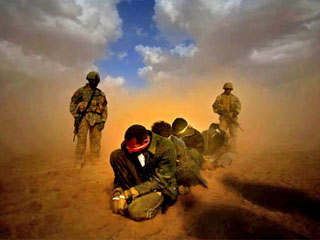Taxi To The Dark Side
by George Sax
Two letters appeared in the Buffalo News the week I saw Taxi to the Dark Side. Both correspondents charged those who complain about the American government’s alleged authorization of torture in the interrogations of terror suspects and prisoners of war with naiveté and lack of patriotic feeling.
Watch the Taxi to the Dark Side trailer
Those writers will likely never see this film, this year’s Oscar Winner for Best Documentary, which questions at least three premises behind such attacks: that torture is legal, that it’s necessary and that it “works.”
Of course, not many people of any political stripe will see it. American audiences don’t go to films for education or challenges to their politics or consciences. A number of recent fiction films about the wars in Iraq and Afghanistan, and one whose subject matter overlaps this one’s (Rendition), performed miserably at the box office, not entirely, one surmises, because of their aesthetic merits.
Taxi opens with a few brief, radiantly appealing shots of a rural Afghan landscape, both verdant and mountainous, depicted in brilliant light that flattens and resolves this rustic panorama into colored planes and shapes like those in a Post-Impressionist painting. In this deceptively tranquil setting, a man in a traditional costume says the film’s first words: “Dilawar was a hard-working, good and honest man.”
Filmmaker Alex Gibney has used this Dilawar’s terrible fate as a springboard for an expansive but tightly organized case against the Bush administration’s unacknowledged authorization of torture against prisoners.

Dilawar was a taxi driver in a provincial Afghan town who picked up three fares one day in 2002. Shortly after, his car was intercepted by members of an American-allied Afghan militia. He and his passengers were detained on suspicion of involvement in rocket attacks on an American army base. They were promptly turned over to the American authorities. Five days later, after repeated mental abuse and physical brutality, Dilawar was found dead in his cell at the Bagram airbase jail. A death certificate issued by the Americans essentially indicated he was beaten to death.
But when the New York Times’ Carlotta Gall asks the commander of American forces in Afghanistan about this manner of death, he responds (on audiotape), “Presently, I have no indication of that.” With quiet, scornful incredulity, Gall repeats his answer later. As Gibney makes clear, the story of Dilawar’s detention, death and probable innocence might not have come to public attention had not Gall and the Washington Post’s Tim Golden dug it out.
Gibney effectively surveys the spread of obscurely justified and arguably illegal interrogation techniques, from Bagram to Guantanamo’s detention facility for “enemy combatants” to Baghdad’s infamous Abu Ghraib prison and points in-between. His swift-paced but methodical reconstruction of the links in the long chain of interrogation-policy development leads, of course, back to the White House.
In an uncommonly candid observation from an “insider,” Lawrence Wilkerson, once chief-of-staff to former Secretary of State Colin Powell, says of the administration that employed him, “They wanted to rewrite the Constitution,” but since they couldn’t, they settled for arbitrarily reinterpreting presidential powers.
Taxi combines an aggressively marshalled but detail-grounded brief with a sense of saddened anger. As Gibney builds his case with a variety of “witnesses” and “exhibits,” Dilawar’s nightmarish story seems to recede in importance. But Gibney returns to it, placing it in his narrative of the autocratically dishonest officials from the president downward who sought to secretly sanction the brutality that all too often characterized American treatment of prisoners.
Taxi succeeds in making clear that those like Dilawar who were caught up in all the suspect pickups and dragnets in Asia and elsewhere have really been a kind of collateral damage in the Bush administration’s recklessly arrogant response to, and exploitation of, 9/11.
|
Issue Navigation> Issue Index > v7n12: The Wizard of Gore (3/20/08) > Taxi To The Dark Side This Week's Issue • Artvoice Daily • Artvoice TV • Events Calendar • Classifieds |









 Current Issue
Current Issue